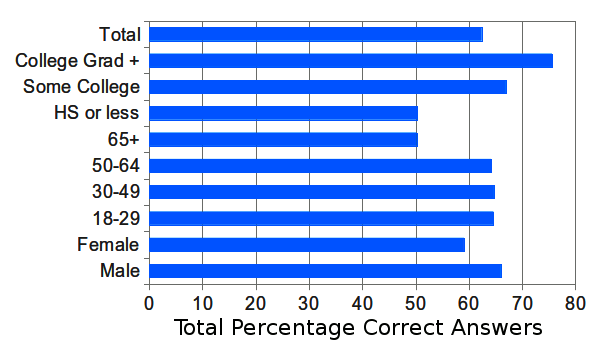
Public Understanding of Science
May 20, 2013 Since we live and work in a world that's now dominated by technology, non-scientists need to have a basic knowledge of science. This should be true especially for our elected government officials, and that's why former Alaskan Senator Ted Stevens' understanding of the Internet as a "series of tubes" became an Internet meme. Perhaps it's our fault for calling high bandwidth channels, "big pipes." Also, half a century ago, there was serious development of a system to carry telecommunications in pipes - microwave waveguides.[1] | If the Internet really was a series of tubes, our routers might look something like this. Ted Stevens may have been remembering the often taught analogy between electrical circuits and plumbing, where voltage is pressure and current is flow. (Via Wikimedia Commons.) |
• True/False - All radioactivity is man-made.The Pew Research web site gives a thorough analysis of the responses to each question. Surprisingly, the question about which gas is the major component of Earth's atmosphere was the one that had the most incorrect responses. In my opinion, the overall scores were quite good, as indicated in the following graph, although some commentators thought the results should have been better.[4]
• True/False - Electrons are smaller than atoms.
• True/False - Lasers work by focusing sound waves.
• True/False - The continents on which we live have been moving their location for millions of years and will continue to move in the future.
• Against which type of solar radiation does sunscreen protect the skin
• Nanotechnology deals with things that are extremely...
• Which gas makes up most of the Earth's atmosphere?
• What is the main function of red blood cells?
• Which of these is a major concern about the overuse of antibiotics?
• Which is an example of a chemical reaction?
• Which is the better way to determine whether a new drug is effective in treating a disease?
• What gas do most scientists believe causes temperatures in the atmosphere to rise?
• Which natural resource is extracted in a process known as "fracking"?
 |
| There's been a lot of talk lately that a college education isn't worth the cost, so it's encouraging that college graduates had the highest scores. Old folks and less educated people had the lowest scores, and men scored somewhat better than women. (Graph by the author, rendered using LibreOffice, from Pew Research data.) |
• What's a mole?Non-chemists would say a mole was a subterranean animal, a skin lesion, or a character from a spy thriller. Chemists know a mole as an Avogadro's number of particles (usually atoms or molecules). Non-chemists would pronounce unionized as union-ized, not a chemist's un-ionized.
• Pronounce unionized.
References:
- J.C. Anderson, J.W. Carlin, D.J. Thomson and T.J. West, "WT4 Millimeter Waveguide System: Field Evaluation Test," The Bell System Technical Journal, December 1977, pp. 2157-2178 (11 MB PDF File).
- Pew Research Center, "Do you know more about science and technology than the average American?".
- Eoin O'Carroll, "Are you scientifically literate? Take our quiz," Christian Science Monitor.
- Phil Plait, "Lord of All I Survey," Bad Astronomy Blog, Slate, May 2, 2013.
- Pew Research Center, "Do you know more about science and technology than the average American?".